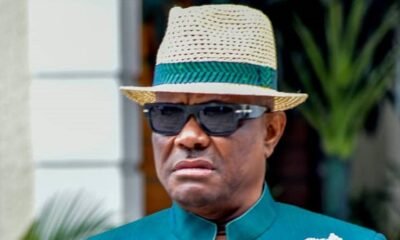News
Human Rights Centre Drags Wike, Tinubu Before UN

A human rights centre, concerned by imminent extinction of two million indigenous people within the Federal Capital Territory (FCT), Abuja, has tabled the matter before a United Nations Body.
The Centre for Human Rights & Civic Education (CHRICED) is concerned systematic exclusion, land dispossession, political disenfranchisement, and cultural erasure, threatens the people, and has approached the Expert Mechanism on the Rights of Indigenous Peoples over the matter.
The human rights centre made the case yesterday during the 18th Session of the body held at the Palais des Nations in Geneva, Switzerland.
It is coming at a time that the FCT minister, Nyesom Wike embarked on controversial policies of sanitising the FCT.
The Executive Director of CHRICED, Dr Ibrahim Zikirullahi, in a statement the vulnerable Abuja’s Original Inhabitants (OIs), comprise nine tribes and seventeen chiefdoms, but now face extinction.
“Today, over two million indigenous people of FCT, Abuja, otherwise known as Original Inhabitants (OIs), face systematic exclusion, land dispossession, political disenfranchisement, and cultural erasure. Without urgent and decisive action, these communities risk extinction,” Dr Zikirullahi stated.
He traced the root of the problem to the Military Decree No. 6 of 1976, which forcefully appropriated their ancestral lands to enable it to establish Nigeria’s new capital.
Governments have failed to provide neither compensation, resettlement, nor legal recognition since the displacement
Dr Zikirullahi who was backed by six delegates, John D. and Catherine T. MacArthur Foundation, in the presentation, also criticised the Nigerian government for failing to uphold both its constitutional guarantees and international obligations under the United Nations Declaration on the Rights of Indigenous Peoples (UNDRIP).
⁵“These injustices contravene both Nigeria’s constitutional guarantees and its obligations under international human rights law,” he said.
READ ALSO: United Nations Conference on Climatic Change.
READ ALSO: Can Innovative Science And Technology Address Climate Change Burdens?
“Without accurate and inclusive data, the lived realities of Abuja’s Original Inhabitants remain obscured, and their rights continue to be denied.
“Data is not just a technical tool, it is a vehicle for justice, visibility, and empowerment,” the CHRICED boss stated.
The centre said the people have lost opportunity to express their fundamental human rights, and have been rendered stateless, since they are not opportune to political representative like legislatures or governors.
The traditional livelihoods and heritages of the people, including farming, fishing, hunting, and craftsmanship are at the fringes of extinction due to unchecked urban expansion and ecological degradation.
The communities lack access to basic amenities such as functional healthcare, quality education, clean water, sanitation, and infrastructure.



























